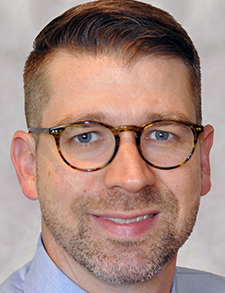 Every SHM chapter likes to focus on the so-called big-tent philosophy, the idea that a group’s success is enhanced by having members who aren’t just hospitalists, but who are in the hospital medicine orbit.
Every SHM chapter likes to focus on the so-called big-tent philosophy, the idea that a group’s success is enhanced by having members who aren’t just hospitalists, but who are in the hospital medicine orbit.
Not every chapter has a pharmacist for a chapter leader, but Iowa does.

Dr. Farley
“Everyone has their areas of expertise and areas of experience that have made them the person they are,” said Iowa Chapter president T. Michael Farley, PharmD, FHM. “We get together and work as a team for patient care, but also work as a team to learn and collaborate and grow as practitioners and individuals.”
So how does a pharmacist take over the top spot at an SHM chapter?
Dr. Farley had been working with a group of hospitalists for years at Mercy Hospital Iowa City in Iowa City and there was interest in launching a state chapter. That started in 2014 and in the years since, he stayed involved as he saw the value in “forwarding the team-based approach, working together with things in terms of continuing education, building networks.”
Perhaps nothing exemplifies that approach more than Progress 2023: Learning Together in the 21st Century. The event, held in October in Coralville, Iowa, was put on by the SHM Iowa Chapter, the American College of Physicians’ statewide chapter, and the University of Iowa Carver College of Medicine and its College of Pharmacy.
“It speaks to the collaborative approach, the teamwork approach, the big-tent approach we try to have,” said Dr. Farley, a clinical associate professor at the University of Iowa College of Pharmacy and a clinical pharmacy specialist on Mercy Hospital’s hospitalist team. It’s “getting together and learning together, which I think has been a positive thing for working relationships in the region and the state.”
Dr. Farley is conscious that too much of a big-tent philosophy can border on noise.
“Sometimes, you do get too many cooks in the kitchen, especially in the context of patient care,” he said. “But in the context of the team and bringing different knowledge to the table … I think when we have different perspectives, we get more nuance in our understanding of how to do things well.
“Obviously, from a patient-safety perspective, having a number of different eyes with different perspectives allows you to catch things that someone with a certain perspective might miss.”
Dr. Farley calls it “the Swiss cheese model” where different knowledge areas help everyone fill in each other’s gaps.
“Together, we make a better product,” he said.
As it relates to the 130-member chapter, it’s working.
Quite well.
The Iowa outpost won a Platinum Excellence Award in 2022 and he credits past presidents Martin Izakovic, MD, FACP, MHA, PhD, SFHM, Melinda Johnson, MD, FACP, SFHM, and Dianna Edwards, MD, FHM, as well as the current leadership team of president-elect Daniel Leary, MD, PhD, membership director Kristen Followwill, DO, secretary Ethan Kuperman, MD, SFHM, treasurer Matthew Bauer, MD, and chapter advisory board member Melinda Johnson, MD, FACP, SFHM.
“I attribute the success of the chapter to the past leaders setting a high bar and trying to continue that with the current leadership team,” Dr. Farley said. “Looking at how we can grow, refine things, and make it better.”
In a move that should surprise no one given the chapter’s inclusive philosophy, growth to Dr. Farley means an even bigger tent.
“One of the things we’re trying to do with the chapter going forward is involving residents at a higher level,” he said. “We have a poster session that a lot of residents are involved in at the progress meeting, but we’re also looking at how we can further that and get them more involved as the future of our chapter. We’re thinking about job fairs, keeping them engaged with topics of interest that they might have. Thinking about contracts, thinking about how they might have a good work-life balance.”
In a statewide chapter where members can be hours apart geographically, Dr. Farley says one key to success is a mix of in-person and virtual events. By moving physical meetings around the state, the chapter makes it easier to broaden its reach—and by embracing Zoom meetings and other technology that became much more accepted in the years since the COVID-19 pandemic started, that reach stays broader.
But meeting people where they are isn’t just a function of geography.
It’s Dr. Farley’s view on how to engage members.
“We want to supply our members with things they think are valuable, experiences they think are valuable,” he said. “We want to make connections with everyone in the tent and get that positive experience, which is ultimately why people are involved in these organizations. They want to have a good experience, they want to be engaged, they want to be involved in moving things forward.”
Richard Quinn is a freelance writer in New Jersey.